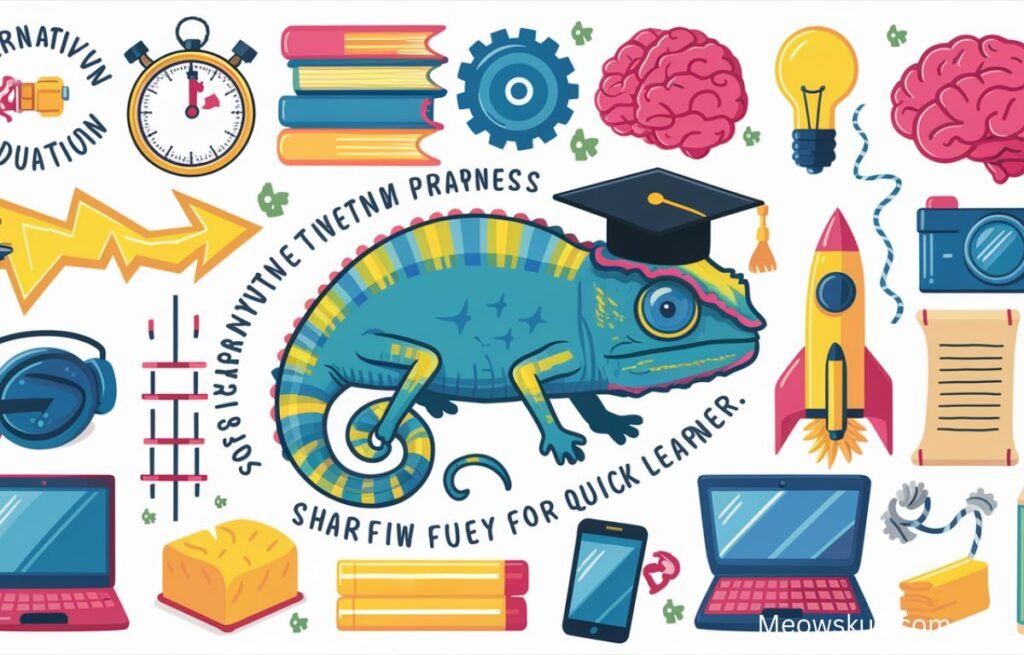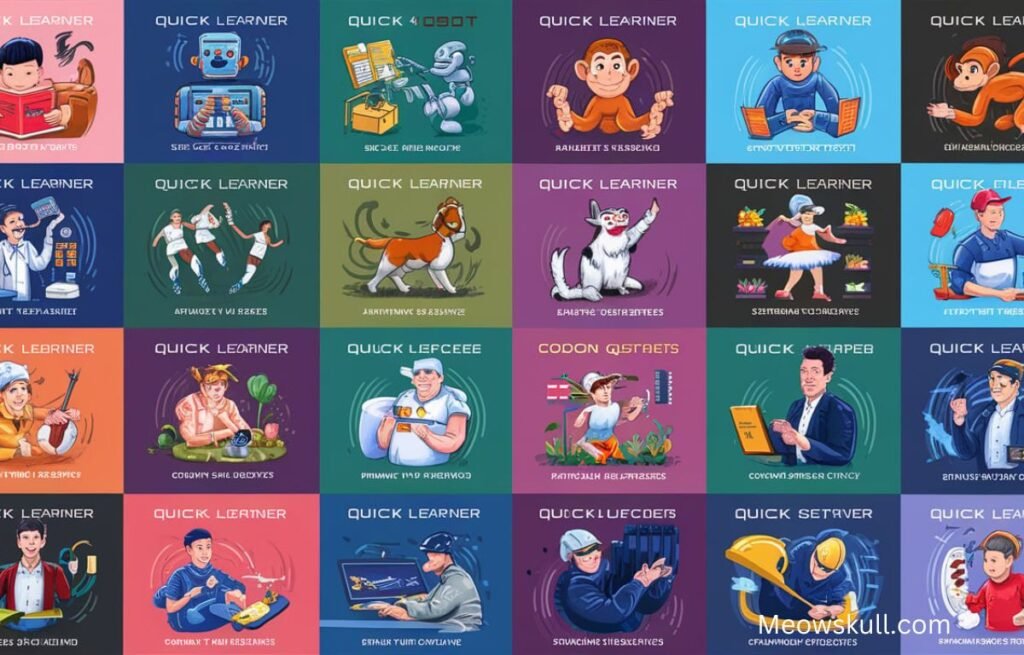In today’s fast-paced world, being able to adapt and learn quickly is a valuable skill. Whether you’re updating your resume, crafting a LinkedIn profile, or just trying to describe your abilities in a more dynamic way, finding alternatives to the phrase “quick learner” can make your profile stand out. Below, we’ll explore 17 other ways to say “quick learner” that can help you showcase your adaptability and intelligence in a more engaging way.
1. Adept at Grasping New Concepts
If you want to emphasize your ability to understand new ideas rapidly, this phrase is perfect. It highlights not only your learning speed but also your intellectual capacity.
Why It Works:
Using “adept” signals proficiency, and “grasping new concepts” focuses on your ability to comprehend complex ideas quickly.
2. Fast at Absorbing Information
This alternative highlights how quickly you can take in and understand information. It’s a straightforward way to convey your quick learning ability.
Why It Works:
The word “fast” immediately suggests speed, while “absorbing information” gives a clear picture of your ability to take in knowledge.
3. Highly Adaptable
Being “highly adaptable” implies that you not only learn quickly but can also adjust to new situations with ease. It shows that you can handle change and thrive in new environments.
Why It Works:
Adaptability is a key skill in many industries, making this phrase a strong alternative to “quick learner.”
Also Read: The Ultimate Guide to the Fortnite Raven Team Leader
4. Proficient at Acquiring New Skills

This phrase is ideal when you want to highlight your skill acquisition abilities. It’s perfect for resumes or professional profiles.
Why It Works:
“Proficient” suggests that you are more than just capable, and “acquiring new skills” indicates that you continuously seek to improve yourself.
5. Eager to Learn
Sometimes, showcasing your enthusiasm for learning can be just as powerful as highlighting your speed. “Eager to learn” conveys that you’re passionate about gaining new knowledge.
Why It Works:
This phrase adds a personal touch, showing not only that you can learn quickly but that you are motivated to do so.
6. Quick to Understand
If you need a simple and direct way to say “quick learner,” “quick to understand” is a great choice. It’s clear and to the point.
Why It Works:
It conveys the same meaning as “quick learner” but with a slight variation that keeps your language fresh.
7. Swift in Comprehending
This phrase adds a touch of sophistication to the idea of being a quick learner. It’s ideal for more formal settings or when you want to sound more polished.
Why It Works:
“Swift” is a strong, vivid word, and “comprehending” suggests a deep understanding.
Also Read: The Fascinating World of the Coyote Skull
8. Knack for Learning Quickly

A “knack” implies a natural talent or ability, making this phrase a great way to describe your quick learning skills in a positive light.
Why It Works:
It’s informal yet impactful, and it suggests that learning quickly comes naturally to you.
9. Rapid Learner
This is a straightforward and slightly more formal way to say “quick learner.” It’s great for resumes and cover letters.
Why It Works:
“Rapid” is a powerful word that suggests speed, making this a direct yet effective alternative.
10. Capable of Picking Up New Skills Easily
This phrase focuses on the ease with which you can learn new skills. It’s an excellent way to show that you’re not only quick but also efficient.
Why It Works:
It emphasizes both speed and ease, making it clear that learning new skills is a breeze for you.
11. Efficient at Learning New Information
If you want to highlight both speed and efficiency, this phrase does the job. It shows that you can learn quickly and without wasting time.
Why It Works:
“Efficient” is a powerful word that employers love, as it suggests that you get things done quickly and correctly.
12. Quick to Adapt
This phrase is perfect if you want to emphasize not just your learning speed but also your ability to apply that knowledge in new situations.
Why It Works:
It combines the ideas of quick learning and adaptability, two highly sought-after skills.
13. Skillful at Adapting to New Information
Here, “skillful” suggests a high level of proficiency, and “adapting to new information” shows that you can take in new knowledge and apply it effectively.
Why It Works:
This phrase is ideal for more professional or technical settings where you want to sound polished and competent.
Also Read: The Fascinating World of Fox Skulls: A Comprehensive Guide
14. Readily Absorbs Knowledge

This phrase is a slightly more creative way to say that you learn quickly. It suggests that you take in knowledge easily and with enthusiasm.
Why It Works:
“Readily” suggests eagerness and willingness, while “absorbs knowledge” paints a vivid picture of your learning ability.
15. Fast in Picking Up New Ideas
This is a casual and approachable way to describe your ability to learn quickly. It’s great for less formal settings or when you want to keep your tone light.
Why It Works:
It’s simple and straightforward, making it easy for anyone to understand your point.
16. Sharp at Learning
“Sharp” is a powerful word that suggests intelligence and quickness, making this a strong alternative to “quick learner.”
Why It Works:
It adds a bit of an edge to your description, making you sound sharp-minded and capable.
17. Acquires New Knowledge Rapidly
This phrase is perfect for more formal or technical settings. It shows that you not only learn quickly but that you do so in a structured, effective way.
Why It Works:
“Acquires” is a formal word that adds weight to your claim, and “rapidly” suggests that you don’t waste any time.
Conclusion
Finding the right words to describe your skills is crucial, especially in a competitive job market. By using these 17 alternatives to “quick learner,” you can showcase your adaptability, intelligence, and eagerness to grow in a more engaging and varied way. Remember, the key to standing out is not just in what you say, but in how you say it. So, mix and match these phrases to create a description that truly reflects your unique abilities. Whether you’re writing a resume, a cover letter, or just updating your professional profile, these alternatives can help you communicate your strengths in a way that sets you apart from the crowd.
FAQs
What Does It Mean to Be a Quick Learner?
Being a quick learner means you have the ability to understand and process new information or skills rapidly. It’s a valuable trait that allows you to adapt to new situations, jobs, or technologies with minimal training or guidance.
Why Is It Important to Use Alternatives to “Quick Learner”?
Using alternatives to “quick learner” is important because it helps you avoid repetition and makes your resume, cover letter, or profile more engaging. Different phrases can better highlight specific aspects of your learning ability, such as adaptability, efficiency, or enthusiasm.
When Should I Use These Alternatives?
You should use these alternatives whenever you need to describe your learning abilities in a professional context. This could be on your resume, in a job interview, or when writing a LinkedIn profile. The variety allows you to tailor your language to the specific job or audience.
Can These Alternatives Be Used in Any Industry?
Yes, these alternatives can be used across various industries. Whether you’re in tech, healthcare, education, or business, being able to learn quickly is a universal skill that employers value. However, you may want to choose phrases that best align with the specific requirements of your industry.
Are Some Alternatives Better for Certain Roles?
Absolutely. For example, “Highly Adaptable” might be more suitable for a role that requires frequent changes, while “Proficient at Acquiring New Skills” could be ideal for a technical job that demands continuous learning. Choosing the right alternative depends on the job description and what the employer is looking for.
How Can I Incorporate These Phrases into My Resume?
To incorporate these phrases into your resume, consider where you mention your skills or past experiences. For example, in a skills section, you might write, “Highly Adaptable to New Technologies.” In your job experience section, you could say, “Demonstrated proficiency at acquiring new skills quickly.”
Should I Use Multiple Alternatives on My Resume?
It’s a good idea to use different phrases throughout your resume to avoid repetition and keep your language fresh. However, be mindful of overloading your resume with too many synonyms; balance is key. Choose the phrases that best describe your unique strengths and experiences.
Can These Alternatives Help in an Interview?
Yes, these alternatives can be very useful in an interview. If asked about your strengths, you can describe yourself as “Quick to Adapt” or having a “Knack for Learning Quickly.” These phrases can make your answers more memorable and impactful.
Do These Alternatives Also Work for Cover Letters?
These alternatives are excellent for cover letters. They allow you to describe your learning ability in a more dynamic way, which can help your cover letter stand out. For example, you could write, “I am eager to learn and highly adaptable to new environments.”
Are There Any Phrases I Should Avoid?
While all the alternatives listed are effective, be cautious about overusing any phrase or choosing one that doesn’t align with your actual abilities. It’s important to be honest in your descriptions, as employers value authenticity.
How Can I Make Sure My Resume Stands Out?
To make your resume stand out, use a combination of these alternatives along with specific examples of how you’ve demonstrated these skills in the past. For instance, rather than just saying you are “Swift in Comprehending,” provide an example of a time when you quickly learned a new tool or process and how it benefited your team.
Can These Alternatives Improve My LinkedIn Profile?
Yes, these alternatives can significantly enhance your LinkedIn profile. By using varied and dynamic language, you make your profile more engaging, which can attract more connections and job opportunities. For example, in your summary, you might write, “With a knack for learning quickly, I have successfully adapted to various roles across different industries.”
What Should I Do if I’m Not Sure Which Phrase to Use?
If you’re unsure which phrase to use, consider the context and the message you want to convey. Think about the specific skills the job or audience values most and choose the phrase that best aligns with those requirements. You can also try out different phrases and see which one resonates best with your professional identity.

As a seasoned contributor to “Meowskull”, Rosalie combines her linguistic prowess with a keen understanding of various topics, ensuring a delightful and informative reading experience. Her articles effortlessly blend clarity, creativity, and a touch of elegance, making language exploration an exciting journey for readers.